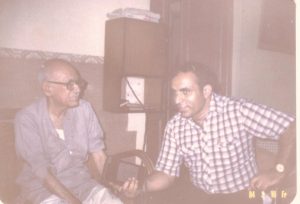Peace Watch » Editor's Take, Kashmir-Talk, Perspectives » Autobiographical: Khawaja Ahmad Abbas and Kashmir
Autobiographical: Khawaja Ahmad Abbas and Kashmir
Nostalgia
Meeting K. A. Abbas
ZGM
 In the city of seven islands, every Sunday had its beauty for me; it always had a new thrill and excitement. To enjoy the poetic beauty of the city in all its aesthetics, I more than often boarded a red double-decked bus at the bus stand outside my home in Colaba. Those days at the bus stands, elevators, and escalators the city was also magnificent for its discipline. To see, a man or a women jumping over a queue was the rarest of the scenes, even if a newcomer like me to the city ever violated the norm, a poke with an umbrella by a humble Parsee was a big reminder, ‘you cannot do it.’ Some one has said about this city that has cradled greatest South Asian leaders – it’s ‘every deserted street corner conceals a crowd.’ Let, may say in this city every street corner has a hidden treasure- it only needs a discerning eye to explore the pearls and gems scattered around.
In the city of seven islands, every Sunday had its beauty for me; it always had a new thrill and excitement. To enjoy the poetic beauty of the city in all its aesthetics, I more than often boarded a red double-decked bus at the bus stand outside my home in Colaba. Those days at the bus stands, elevators, and escalators the city was also magnificent for its discipline. To see, a man or a women jumping over a queue was the rarest of the scenes, even if a newcomer like me to the city ever violated the norm, a poke with an umbrella by a humble Parsee was a big reminder, ‘you cannot do it.’ Some one has said about this city that has cradled greatest South Asian leaders – it’s ‘every deserted street corner conceals a crowd.’ Let, may say in this city every street corner has a hidden treasure- it only needs a discerning eye to explore the pearls and gems scattered around.
Like thousands of bibliophiles, the secondhand book street that on Sundays came to full life for me also was a trove of pearls. Sometimes, I involuntarily disembarked from the bus at the Victoria Terminus walked towards the Flora Fountain, to look for some second hand books of my interest on the pavements of the Fort area. Looking through stacks and stacks of books was a laborious job but at the end always rewarding. One Sunday, looking at the piles of books at a stall I spotted a hardcover book, titled ‘I Am Not An Island,’ The book for its tiltle borrowed from one of John Donne’s famous line, ‘No man is an Island, entire of itself’ instantly attracted my attention. It was autobiography of Khawaja Ahmad Abbas – interestingly the book had a subtitle ‘An Experiment in Autobiography.’ From my teens, I was familiar with the name of the author. Moreover, during my days in college and on the campus, I used to read his column ‘The Last Page,’ almost without fail. Those days, I was too obsessed with two Bombay weeklies the Blitz edited by R.K. Karanjia and the Current edited by Ayub Syed.
Number of times after my posting in the great city, I had thought of visiting the great filmmaker, screenplay writer, journalist and short story writer- who then was not keeping good health. Filliping through his book and knowing about his interest in Kashmir from early thirties when he had first come to Kashmir to meet his cousin Khawaja Ghulam Saadian, then Director School education of Kashmir, I became more curious to meet him. A few days later, I visited him in Race Course Hospital where he was under treatment. Everything about his visits to Kashmir and his meetings with Nehru about Kashmir were so fresh with him as if it had just happened the other day. The moment, I gave him my introduction, he turned nostalgic about his association with Kashmir and remembered not only names of politicians but also of many writers from Som Nath Zutshi to Mirza Arif. I thought of recording his reminisces. After this meeting, I visited him on many Sundays at his residence in Philomena Apartments, Juhu Tara Road Vile Parle for longer conversations. Talking to him, in fact, was ‘eavesdropping on the heart beats of history.’ On a couple of occasions, for meeting this great writer, I took along with me some of my friends visiting the city of dreams along. They mostly remembered him for having written stories and screenplays of great films like Awara and Shri 420. During a couple of sittings, I interviewed him about future of Urdu in India, future of ideological and art films in India and reasons for his and other progressive writes involvement in Kashmir in 1948 and after. I also interviewed him about his association with Sheikh Mohammad Abdullah and Jawaharlal Nehru and deposition of Sheikh Abdullah in 1953 and if Rafi Ahmed Kidwai and Aneesa Kidwai had any direct role in it. He ruled Kidwai having a role in dismissal and arrest of Sheikh in 1953. It was at Nehru’s bidding progressive writers had got involved in Kashmir- for him and writers from Krishan Chander to Sajed Zaheer to Rajinder Singh Bedi Kashmir was laboratory for testing socialists’ ideas……………………….
Filed under: Editor's Take, Kashmir-Talk, Perspectives







